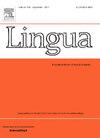Stance-taking and (inter)subjective roles of Mandarin zhende (ma/a)
IF 1.3
3区 文学
0 LANGUAGE & LINGUISTICS
引用次数: 0
Abstract
This study explores the non-interrogative functions of the newsmark zhende (ma/a) (‘really’) in Mandarin conversation interaction, focusing on its stance-taking and (inter)subjective roles in systematically context-sensitive ways. Drawing on spontaneous conversational data and a discourse-pragmatic approach, we identify affective, evaluative, and alignment stances associated with zhende (ma/a) that extend beyond its epistemic function as a reaction to unexpected information and its affective role as an expression of surprise. The nuanced stance-taking activities reveal three key manifestations of (inter)subjectivity, primarily tied to the stance object targeted: (1) a device for involvement and rapport-building responding to irrelevant information; (2) an emotionally charged stance marker when addressing relevant information; and (3) a buffering mechanism for managing awkward moments, maintaining rapport in response to assessments directed at the zhende (ma/a) speaker. Additionally, the syntactic position of zhende (ma/a) also facilitates its intersubjective impact, particularly regarding its metadiscursive function. This study highlights the nuanced interplay between stance-taking and (inter)subjectivity and underscores the importance of contextual features in interpreting the non-interrogative functions of newsmarks, offering valuable insights into stance-taking and its (inter)subjective roles in Mandarin conversation interaction and beyond.
普通话真德的立场与(间)主体性角色(ma/a)
本研究探讨了新闻标记真德(ma/a)(“真的”)在普通话会话互动中的非疑问句功能,重点研究了它在系统的语境敏感方式下的立场和(相互)主观作用。利用自发会话数据和话语语用学方法,我们确定了与真德(ma/a)相关的情感、评估和一致性立场,这些立场超出了其作为对意外信息的反应的认知功能和作为惊讶表达的情感角色。微妙的立场采取活动揭示了主体性(间)的三种主要表现形式,主要与所针对的立场对象有关:(1)对不相关信息的参与和建立关系的反应;(2)在处理相关信息时情绪化的立场标记;(3)管理尴尬时刻的缓冲机制,在回应针对真德说话者的评价时保持融洽的关系。此外,真德(ma/a)的句法位置也促进了它的主体间影响,特别是在其元话语功能方面。本研究强调了立场和主体性之间微妙的相互作用,强调了语境特征在解释新闻标记的非疑问句功能中的重要性,为立场及其主体性在普通话会话互动中的作用提供了有价值的见解。
本文章由计算机程序翻译,如有差异,请以英文原文为准。
求助全文
约1分钟内获得全文
求助全文
来源期刊

Lingua
Multiple-
CiteScore
2.50
自引率
9.10%
发文量
93
审稿时长
24 weeks
期刊介绍:
Lingua publishes papers of any length, if justified, as well as review articles surveying developments in the various fields of linguistics, and occasional discussions. A considerable number of pages in each issue are devoted to critical book reviews. Lingua also publishes Lingua Franca articles consisting of provocative exchanges expressing strong opinions on central topics in linguistics; The Decade In articles which are educational articles offering the nonspecialist linguist an overview of a given area of study; and Taking up the Gauntlet special issues composed of a set number of papers examining one set of data and exploring whose theory offers the most insight with a minimal set of assumptions and a maximum of arguments.
 求助内容:
求助内容: 应助结果提醒方式:
应助结果提醒方式:


